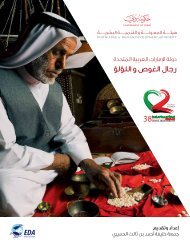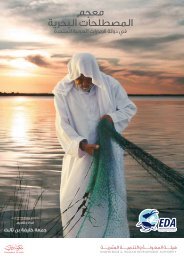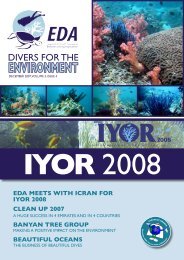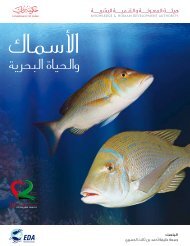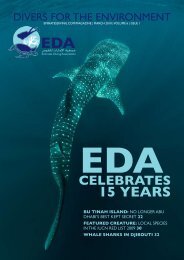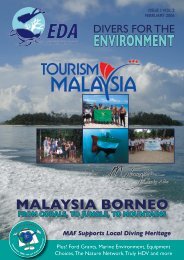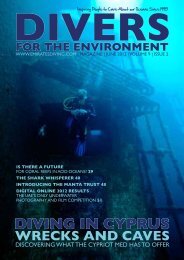Download - Emirates Diving Association
Download - Emirates Diving Association
Download - Emirates Diving Association
Create successful ePaper yourself
Turn your PDF publications into a flip-book with our unique Google optimized e-Paper software.
FEATURES<br />
people. Enhanced individual responsibility,<br />
new industry leadership, innovative science<br />
and smart public policy represent the needed<br />
components of a comprehensive solution to<br />
the ongoing challenge of ocean trash.<br />
• The Cleanup is an essential step of picking<br />
up trash after it’s already ended up in the<br />
wrong place.<br />
• Rippl, Ocean Conservancy’s new mobile<br />
app, aims to address trash at the starting<br />
point – or even before it’s created.<br />
• The Trash Free Seas Alliance touches on<br />
the point after trash is created and used,<br />
but before it’s thrown away. The hope is<br />
that innovation drives alternatives.<br />
Ocean Conservancy is digging deeper into<br />
ocean trash. Starting with Cleanup events in<br />
2013, Ocean Conservancy will distribute new<br />
data forms that will help us learn more about<br />
what kinds of debris are polluting beaches and<br />
waterways around the world.<br />
The Cleanup data forms are more specific,<br />
asking volunteers to note not just the type of<br />
items they find but what they are made of as<br />
well. Understanding what kinds of materials<br />
are on our beaches is important in order<br />
to advocate for product redesign or new<br />
policy solutions that would address the most<br />
problematic items and materials.<br />
Every piece of trash that is picked up during<br />
the Cleanup should be a challenge for change.<br />
Trash simply shouldn’t be in the ocean or on<br />
a beach. Questions we should think about for<br />
every item picked up: How did it get there?<br />
How can we prevent it from happening again?<br />
Whether it is by changing your habits to<br />
create less trash, or pushing industries and<br />
governments to find alternative uses, we can<br />
work together to find a solution.<br />
We have a responsibility all year long to reduce,<br />
remove and reinvent. From product development<br />
to disposal, we all have a role to play.<br />
We can’t do it alone. While solutions are built<br />
on individual actions of people, organizations<br />
and companies, it will take a collective<br />
movement to make the biggest difference. We<br />
need more volunteers than ever to join our<br />
movement and make a bigger difference. Here<br />
are three things you can do:<br />
1. Be a part of the International Coastal Cleanup!<br />
2. Pledge to fight trash: What would happen<br />
if 10,000 people decided not to make<br />
as much trash for one month? We could<br />
reduce the trash on Earth by over a million<br />
pounds. Take the pledge to help turn the<br />
tide on trash.<br />
3. <strong>Download</strong> Rippl, Ocean Conservancy’s free<br />
mobile application that helps you make<br />
simple, sustainable lifestyle choices.<br />
There are uncontrollable events – like the Japan<br />
tsunami – that add to the problem of marine<br />
debris. That’s why it’s important to tackle<br />
what’s preventable. The tsunami debris was<br />
unpreventable, but ocean trash is. Our ocean<br />
needs to be healthy and resilient when these<br />
unthinkable, uncontrollable events take place.<br />
We hope data from our Cleanups in the past<br />
will be able to provide a baseline for the kinds<br />
of debris washing ashore on the West Coast<br />
and Hawaii. For 28 years, Ocean Conservancy<br />
has been organizing Cleanups – an opportunity<br />
to gather data and a snapshot of what is found<br />
on our beaches and coastlines. This will make it<br />
easier to compare with what will wash ashore<br />
in the months and years to come.<br />
Our vision is for Trash Free Seas. This problem<br />
is human-generated and preventable. Keeping<br />
our ocean free from trash is one of the easiest<br />
ways we can make the ocean more resilient.<br />
From product design to proper trash disposal,<br />
we all have a role to play in keeping our ocean<br />
clean and free of debris.<br />
In addition to the Cleanup, Ocean<br />
Conservancy-led efforts include building a<br />
Trash Free Seas Alliance ® of industry, science<br />
and conservation leaders committed to<br />
reduce waste and supporting a working group<br />
at the world’s leading ecological think tank, The<br />
National Center for Ecological Analysis and<br />
Synthesis (NCEAS), to identify the scope and<br />
impact of marine debris on ocean ecosystems.<br />
CLEAN UP ARABIA 2013<br />
YOU MAKE A DIFFERENCE<br />
Register your friends and families for Clean Up Arabia 2013 on the 22 nd and 23 rd of<br />
November and make the difference with us. Clean Up details and locations will become<br />
available soon. Become an EDA member today to receive all the EDA event updates!<br />
EMIRATES DIVING ASSOCIATION | HERITAGE & DIVING VILLAGE, SHINDAGHA AREA, P.O. BOX 33220, DUBAI, UAE<br />
EDA is a non-profit voluntary federal organization and is accredited by UNEP as an International Environmental Organization.<br />
Tel: +971 4 393 9390 | Fax: +971 4 393 939 1 Email: diving@emiratesdiving.com, projects@emiratesdiving.com | Website: www.emiratesdiving.com<br />
Join our group page on http://www.facebook.com/pages/<strong>Emirates</strong>-<strong>Diving</strong>-<strong>Association</strong>/140646949296859?ref=ts and share your thoughts and stories!<br />
Follow us on http://twitter.com/EDA_UAE and send us your tweets!<br />
28 DIVERS FOR THE ENVIRONMENT, SEPTEMBER 2013<br />
SEPTEMBER 2013, DIVERS FOR THE ENVIRONMENT 29



